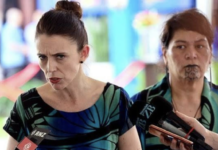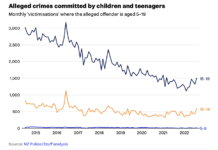|
Some modest advances in child poverty reduction have been made since the passing of the Child Poverty Reduction Act in 2018, but rangatahi (youth) with lived experience of poverty say it’s time for immediate action. At the launch of the Child Poverty Monitor Report 2022 youth took a stand to present a declaration of child poverty for rangatahi to the Children’s Commissioner, Judge Frances Eivers. One rangatahi made a simple statement, cutting to the heart of why poverty matters— “My childhood was taken away from me.”
The message was clear. Rangatahi who have experienced poverty have found their voice, and they want change. Now. Not just for themselves, but for future mokopuna (children), so no one else has to struggle as they have.
The Child Poverty Action Group (CPAG) support them every step of the way, and join their call for immediate action.
The Child Poverty Monitor Report is a collaboration between the Children’s Commissioner and the Child and Youth Epidemiology Service at the University of Otago. The latest report paints a bleak picture of child poverty and its continuing effects on childhood disease and illness in New Zealand.
TDB Recommends NewzEngine.com
CPAG health spokesperson Emeritus Professor Innes Asher says “Children being admitted to hospital for preventable diseases (“potentially avoidable hospitalisations”) is a key marker of child poverty. These diseases, most common in babies, can cause lifelong damage. Last year, to December 2021 (even though numbers were lower because of Covid-19 preventive measures), the 40% of children living in areas of the greatest disadvantage (deprivation quintiles 4 and 5) were about twice as likely to be admitted to hospital than the other 60% of children.
This ratio has actually worsened since 2000, when it was only the 20% children in quintile 5 who were admitted at about double the rate. These trends suggest that inequities are increasing and widening – policy decisions related to poverty are not reaching those who need it most. Māori and Pacific children are left out.”
|
|
|
CPAG says it’s time New Zealanders recognise that child poverty robs children of their childhood with lifelong harm. “Each young person affected faces hardship, resulting from drivers of poverty such as colonisation across areas of health, education, housing, and transport. We echo the request from rangatahi for an ‘across government’ approach that includes all central, regional, and local government departments working with communities who know intimately the drivers of poverty and the responses needed.” says Dr Dana Wensley, CPAG Researcher.
The Child Poverty Action Group calls on the government to take these immediate steps to address high rates of poverty, especially for those most deeply affected:
(1) In recognition of the intergenerational hardship and drivers of poverty, “persistent poverty” must be measured now, not wait until 2025 (as indicated under the Child Poverty Reduction Act). “The most vulnerable of our mokopuna are experiencing poverty across multiple years of their childhood, as have their parents. Current data does not show us how many are affected across consecutive years. We call on Prime Minster Jacinda Arden to direct the chief statistician to define and measure persistent poverty with immediacy. This is necessary to ensure that no child is left behind,” says Dana Wensley.
(2) Poverty must be placed in the wider context of colonisation and obligations of New Zealand under both the United Nations Convention on the Rights of the Child and te Tiriti o Waitangi. A new partnership model for addressing child poverty needs to be adopted. We call on the government to immediately establish an independent Child Poverty Advisory Council which includes the voices and input of rangatahi and those with lived experience of poverty. This would operate as a centre of excellence to guide strategy and design responses that work. |






To make improvements we need to stop talking and start doing something.